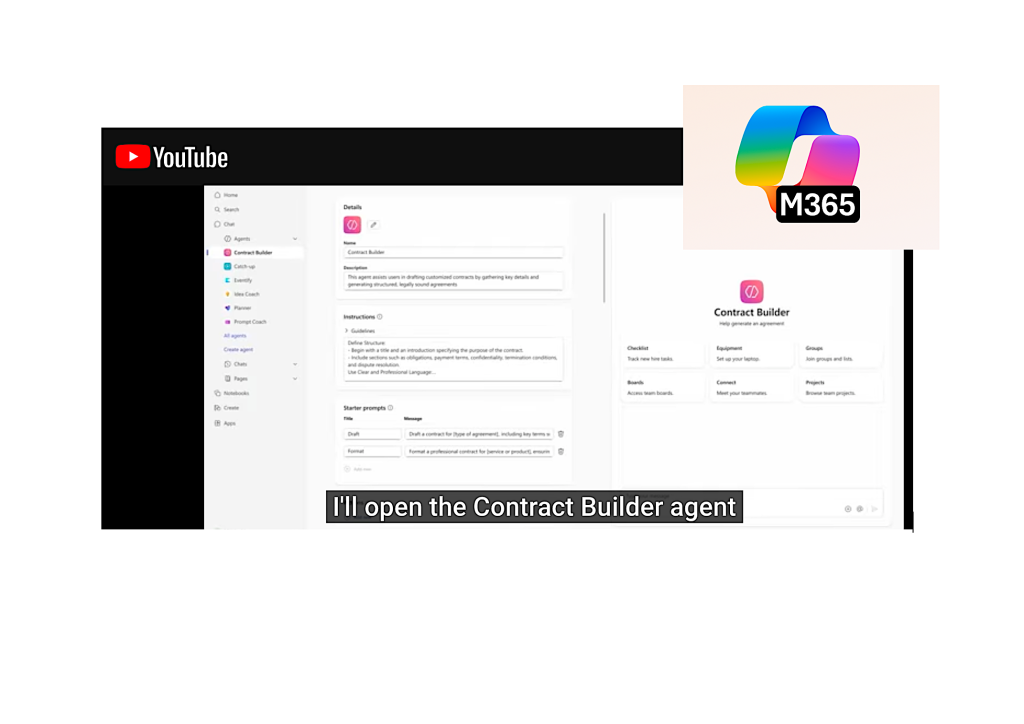
Tech giant Microsoft has demoed what it’s calling a Contract Builder Agent and also showed (very briefly) how it can be fine-tuned. At first glance it seems to be a threat to legal tech tools, but dig deeper and doubts emerge.
As part of the Microsoft Build 2025 event yesterday, the company showed how you can create multiple agents to perform tasks, and even how those agents can work together. They gave the example of doing a compliance check on an RFP, then moved onto writing a contract using an agent.
See the steps below (and also the video – start from about 4 mins in.)



The basic gist of it is this:
You set out what the agent will do.
You explain its tasks, e.g. ‘include sections such as obligations’.
You set out prompts for guiding the agent.
But, perhaps the key point was about training and fine-tuning the agent. This is something that came to AL’s mind when agents first arrived – as the user effectively goes back to the old school machine learning methods to get the agent to be accurate in its work. I.e. this is not about prompting, but once again literally training the software (in this case the agent) to do the right thing, in the right way via the input of a human expert. In short, it’s similar to what we did before with NLP / ML, or at least in that ballpark.
And that’s one of the ironies of agents – they need to be trained as if they were 2016-style tech…!
The demo presenter said that you can also access model contracts from Sharepoint and then bring in subject matter experts, (also known as lawyers….) to refine the outputs. This part was skipped through in about 3 seconds, but it’s vital.
What quality are these comparator contracts and did you find the relevant ones? Do they match the output you want? Who does the training with the agent to perfect its results? How much time does it take? How many steps do you go through to complete this training? Does that mean it’s then totally accurate?
In short, it looks great if you just listen to the demo, but it leaves a lot of unanswered questions and glosses over some really key issues. It also feels like once again some tech folks are acting as if a contract is just any other piece of text, like it’s an email to a customer, rather than considering that a contract has to be 1) super accurate and 2) truly reflect the needs of the parties involved.
And, on the second point, it doesn’t mention negotiation, the back and forth redlining and so forth that contracts inevitably create.
Overall, this is very interesting and shows that ‘Microsoft does legal tech’ now….but, this is not going to worry most legal tech companies…..not yet.
Long-term, however, what it shows is that legal tech will not be immune to the direct interventions of Microsoft – the software that 99% of lawyers live with everyday.
The big question is: how far does Microsoft want to go here in making applications such as a Contract Builder Agent really, really good, compared to just doing a slick demo and then leaving it up the legal world to figure out how to make it work? Is this going to be left as a quick example to show what’s possible, or will the company actually start to make this capability a distinct feature?
To be continued….
—
Legal Innovators California Conference, San Francisco, June 11 + 12
If you’re interested in the cutting edge of legal AI and innovation – and where we are all heading – then come along to Legal Innovators California, in San Francisco, June 11 and 12, where speakers from the leading law firms, inhouse teams, and tech companies will be sharing their insights and experiences as to what is really happening.
We already have an incredible roster of companies to hear from. This includes: Legora, Harvey, StructureFlow, Ivo, Flatiron Law Group, PointOne, Centari, LexisNexis, eBrevia, Legatics, Knowable, Draftwise, newcode.AI, Riskaway, Aracor, SimpleClosure and more.

See you all there!
More information and tickets here.
Discover more from Artificial Lawyer
Subscribe to get the latest posts sent to your email.

